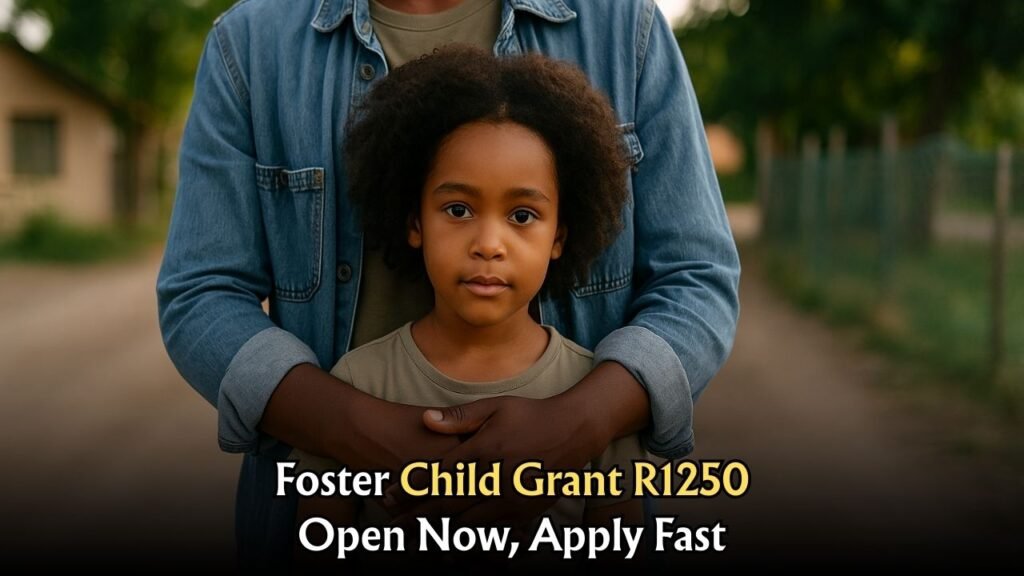Apply for the R1,250 Foster Child Grant Before the September 2025 Deadline: South African families and guardians who care for foster children have an essential opportunity to secure financial assistance through the Foster Child Grant. This grant, valued at R1,250, is designed to support the well-being and development of foster children, providing much-needed relief to caregivers. With the application deadline set for September 2025, it’s crucial for eligible individuals to act promptly to ensure they don’t miss out on this vital support. Understanding the application process, eligibility criteria, and required documentation is key to successfully obtaining this grant, which can significantly ease the financial burden of fostering a child.

Understanding the Foster Child Grant Eligibility Criteria for 2025
The Foster Child Grant is a critical lifeline for many South African families, but it’s important to understand the specific eligibility criteria to ensure successful application. The grant is available to individuals who have been legally appointed as foster parents by the court. This includes both relatives and non-relatives who have taken on the responsibility of caring for a child in need. The child must be under the age of 18 and remain in the foster care system, with an official court order in place confirming the foster care arrangement. Additionally, the child must reside in South Africa, and the foster parent must be a South African citizen, permanent resident, or refugee. Ensuring all these criteria are met is essential for the application to be processed smoothly. Potential applicants should also gather necessary documents such as the foster care court order, the child’s birth certificate, and the applicant’s identity document to facilitate a seamless application process.
Key Steps to Successfully Apply for the R1,250 Foster Child Grant
Navigating the application process for the Foster Child Grant can seem daunting, but following a clear set of steps can simplify the procedure. First, prospective applicants should visit their nearest South African Social Security Agency (SASSA) office to acquire and complete the application form. It is vital to bring all required documents, including the foster care court order, the child’s birth certificate, and the applicant’s identity document, to avoid delays. After submission, the application will be assessed, and applicants may be asked to provide additional information or attend an interview to verify details. Once the application is approved, the grant payments will be made monthly, providing financial support to help with the costs associated with fostering a child. It’s important to note that if any changes occur in the foster care arrangement, such as the child leaving the foster care system, SASSA must be informed immediately to update the status of the grant.
Benefits of the Foster Child Grant for South African Families
The Foster Child Grant offers significant benefits to families and guardians, ensuring that foster children receive the care and support they need. This financial assistance can be used to cover essential expenses such as school fees, clothing, medical care, and other necessities that contribute to the child’s well-being and development. By alleviating some of the financial pressures associated with raising a child, the grant enables foster parents to provide a stable and nurturing environment. Furthermore, the grant plays a critical role in promoting the welfare of vulnerable children, ensuring they have access to opportunities and resources that might otherwise be unavailable. For many foster families, this grant represents not just financial support but a commitment to the future of South Africa’s children.
Important Deadlines and Renewal Information for the 2025 Foster Child Grant
As the September 2025 deadline approaches, it is crucial for eligible foster parents to submit their applications in a timely manner to benefit from the Foster Child Grant. Missing this deadline may result in a loss of financial support, which can significantly impact the welfare of foster children. It is also important to note that the grant is subject to periodic reviews and renewals; therefore, recipients must ensure they remain compliant with all requirements to continue receiving payments. Foster parents should stay informed about any changes in policy or procedure by regularly checking updates from SASSA. Keeping track of renewal dates and maintaining accurate records can help prevent disruptions in grant payments, ensuring consistent support for the foster children in their care.




